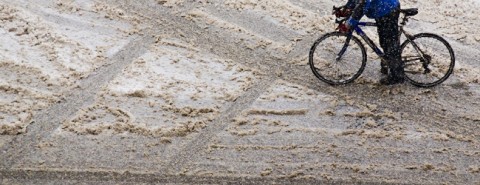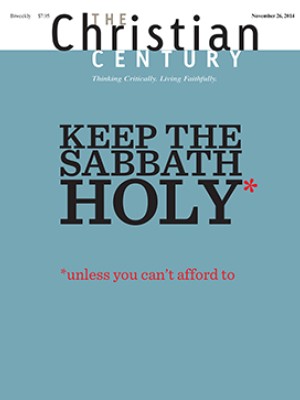Pastor on two wheels: The winter I gave up my car
Last winter the heater in my car went kaput. It was a terrible time for the heater to stop working. I am a pastor in Minneapolis, where winter is a six-month teeth-chattering battle for warmth. And did I mention that this past winter was the ninth coldest in Minneapolis history?
Nevertheless, a heaterless car in a severe winter turned out to be a blessing—or, in the words of Elvis Costello, a brilliant mistake. For months the idea of giving up my car had been stirring in my soul, but I could not find the courage or the imagination to make it happen. One Sunday evening my 13-year-old daughter asked me to explain Christian socialism (youth do pay attention to sermons—sometimes). I did my best. Later, when I was saying goodnight, she asked, “Dad, what are you willing to give up so others can have more?”
Read our latest issue or browse back issues.
I called a family meeting to propose an experiment that would affect us all: we would not repair the heaterless car nor would we buy another car. Instead, we would sell the car, and I would ride my bike or take the bus to work. Everyone agreed.
I was tired of feeling helpless in the face of climate change, tired of being all talk and no action. I would sacrifice a small amount of convenience, choice, and comfort in order to renew my commitment to the healing of creation.
I took some of the proceeds from the sale of the old car and purchased metal-studded bicycle tires, a pair of heavy-duty gloves (the kind a person handling molten steel would wear), and a bus card. I reckoned that if I could make this idea work in the dead of winter, then I could easily do it year-round.
The devils on my shoulders kept questioning my decision, asking: How will you get to the nursing homes in the exurbs? How will you respond to emergencies? What will you do when it rains or snows? What about your clothes (you cannot bike in a suit)? Plus, you’ll arrive late and sweaty to meetings.
I did not have the answers to those questions; I hoped the answers would come as I pedaled and rode the bus.
The first few days were horrible. I had not ridden my bike on a regular basis in years. Every inch of my body was sore afterward. Then there was the cold. In order to counter the below-zero wind that blasted through my layers of clothing, I would repeat the mantra, “Mother Earth, you better appreciate this. Mother Earth, you better appreciate this.”
When it rained or snowed, I took the bus. At first I had no idea about the bus routes or even how to pay for a bus ride. In 14 years of ministry I had taken the bus only once to get to the inauguration ceremonies of a newly elected mayor. I discovered that bus trips offered the equivalent of a course in human studies. Liberals like me may talk about diversity and economic equality, but many of us rarely spend extended time with the poor or share life with the diverse populations of the city. Riding the bus, I found myself sitting or standing beside a Somali woman reading Barbara Ehrenreich’s Nickle and Dimed, a father of five en route from the midnight shift at McDonald’s to his daytime job cleaning offices, a woman with a disability and her abusive aide, a recent college graduate on her way to a job interview, and school kids making their way across the city to the library. Riding in the comfort of my car had kept me from contact or communion with all these people. I had often prayed for the welfare of my city, but I had little idea whom (or what) I was praying for until I rode the bus.
When my pastoral destination in the exurbs was nowhere near a bus stop and too far away for a bicycle commute, parishioners offered to take me. I was uneasy with this reliance on parishioners. I did not like giving up my control of the situation or surrendering my time to another driver. But many of these trips turned out to be extended pastoral visits. As on all good road trips, the discussions in the car were often deep and revealing—moments of unexpected grace.
At the end of each month I tallied up my savings. By owning only one car, my family pays only one insurance bill and fills up only one gas tank. Needless to say, my mileage reimbursement account at church ends each month with a surplus. If my bike needs a repair, the cost is a fraction of that of an auto repair. Thus far I have been able to make all the repairs myself, thanks to a $3.00 used copy of Glenn’s Complete Bicycle Repair Manual.
Bicycles are simple machines with few moving parts; they are difficult to mess up. I spend my days with broken people, broken buildings, and broken bank accounts—complex things that are easy to mess up. There is nothing more satisfying than actually repairing something that’s broken.
Although biking or taking the bus takes longer than driving, these activities offer some fringe benefits. When I bike, I arrive at the church or nursing home with my mind clear and my soul ready. When I take the bus, I can read, rest, and learn from others.
The sacrifice has caused some stress. Each evening I have to spend a few minutes planning out the next day, mapping out routes, double-checking bus times, and developing a backup plan. I have also had to alter my wardrobe—but there is no better outfit for biking and clergy work than a pair of khakis and a clergy shirt with a removable tab collar.
Not everyone can bike to work, and not everyone can take the bus or has access to public transit. But we can do meaningful and symbolic acts that will inspire each other, the churches we serve, and the communities we inhabit. We are not helpless. At rush hour, when I look at the solitary masses in their cars while I am pedaling over I–35 or reading on the bus, I want to shout at the top of my lungs, “There are other choices.” But those choices will never be visible unless people start living differently, making some small sacrifices for the greater good, and in the process becoming better acquainted with the cities we call home and those whose welfare we pray for each Sunday.







